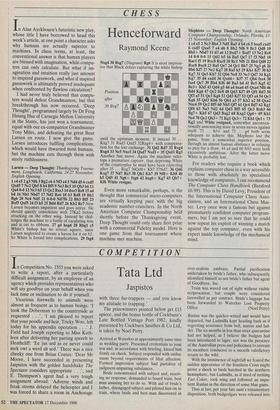CHESS
Henceforward
Raymond Keene
In Alan Ayckbourn's futuristic new play, whose title I have borrowed to head this week's article, at one point a character asks why humans are actually superior to machines. In chess terms, at least, the conventional answer is that human players are blessed with imagination, while compu- ters can only calculate. But what if im- agination and intuition really just amount to inspired guesswork, and what if inspired guesswork is ultimately proved inadequate when confronted by flawless calculation?
I had never truly believed that compu- ters would defeat Grandmasters, but that breakthrough has now occurred. 'Deep Thought', programmed largely by Dr Feng Hsiung Hsu of Carnegie Mellon University in the States, has just won a tournament, equal with our ex-compatriot Grandmaster Tony Miles, and defeating the great Bent Larsen en route. I now give the game. Larsen introduces baffling complications, which would have thwarted most humans, but the machine cuts through them with steely ruthlessness.
Larsen — Deep Thought: Thanksgiving Tourna- ment, Longbeach, California, 24-27 November; English Opening.
1 c4 e5 2 g3 Nf6 3 Bg2 c6 4 Nf3 e4 5 Nd4 d5 6 cxd5 Qxd5 7 Nc2 Qh5 8 h4 Bf5 9 Ne3 Bc5 10 Qb3 h6 11 Qa4 0-0 12 Nc3 b5 13 Qc2 Bxe3 14 dxe3 Re8 15 a4 b4 16 Nbl Nbd7 17 Nd2 Re6 18 b3 Rd8 19 Bb2 Bg6 20 Nc4 Nd5 21 0-0-0 Nd7f6 22 Bh3 Bf5 23 BxI5 Qxf5 24 f3 h5 25 Bd4 Rd7 26 Kb2 Rc7 Now Larsen becomes impatient and goes astray. He should quietly consolidate with 27Ka2 before attacking on the other wing. Instead he chal- lenges the machine to a battle of caculating wits and is cut to ribbons. 27 g4 hxg4 28 Rhgl c5 White's bishop has no retreat square, since Larsen neglected to create a haven for it on b2. So White is forced into complications. 29 fxg4 Nxg4 30 Bxg7 (Diagram) Rg6 It is most impress- ive that Black delays capturing the white bishop
Position after 30 Bxg7
until the op imum moment. If instead 30 ... Kxg7 31 Rxd5 Qxd5 32Rxg4+ with compensa- tion for the lost exchange. 31 Qd2 Rd7 32 Rxg4 Rxg4 33 Ne5 Nxe3 34 Qxd7 Nxd1 + 35 Qxdl Rg3 Another fine move. Again the machine sides- teps a premature capture, thus depriving White of the counterplay he must have been expecting after 35 Rxg7 360d8+ Kh7 37Nd7. 36 Qd6 Kxg7 37 Nd7 Re3 38 Qh2 Kh7 39 Nf8+ Kh8 40 h5 Qd5 41 Ng6+ fxg6 42 hxg6+ Kg7 43 Qh7+ Kf6 White resigns.
Even more remarkable, perhaps, is the thought that commercial micro-computers are virtually keeping pace with the big academic number-crunchers. In the North American Computer Championship held shortly before the Thanksgiving event, Deep Thought could only share first prize with a commercial Fidelity model. Here is one game from that tournament where machine met machine. Mephisto — Deep Thought: North American Computer Championship, Orlando, Florida, 13- 15 November; English Opening.
1 c4 e5 2 Nc3 Bb4 3 Nd5 Ba5 4 b4 c6 5 bxa5 cxd5 6 cxd5 Qxa5 7 e4 d6 8 Bb2 Nf6 9 Bc3 Qd8 10 Bb5+ Nbd7 11 d3 a6 12 Bxd7+ Bxd7 13 Ne2 Rc8 14 0-0 0-0 15 Qd2 b5 16 Ba5 Qe7 17 13 Nh5 18 Racl f5 19 Rxc8 Rxc8 20 Rd l Nf6 21 Bb4 Qd8 22 Rxc8 Bxc8 23 Ba5 Qe7 24 Qcl Bb7 25 Ng3 g6 26 Bb6 Kf7 27 Ne2 Kg7 28 Ba5 h5 29 Khl Kf7 30 h3 Kg7 31 Qe3 Kh7 32 Qb6 Ne8 33 Nc3 Qd7 34 Kg! Kg7 35 d4 exd4 36 Qxd4+ Kf7 37 Qb6 fxe4 38 fxe4 Qe7 39 Bb4 Kf6 40 8a3 h4 41 Bc5 Kg5 42 Be3+ Kh5 43 Qd4 g5 44 a4 bxa4 45 Qxa4 Nf6 46 Bd4 Kg6 47 Qc2 Bc8 48 Qd3 Kf7 49 Qfl Bd7 50 Qf3 a5 51 Qe3 Kg6 52 Qd3 107 53 Qf3 a4 54 Qe3 Kg6 55 Qd3 Kh6 56 Qbl a3 57 Kh2 a2 58 Qxa2 Nxc4 59 Qc2 Bf5 60 Nb5 Q17 61 Qc4 Bd7 62 Kg!
Qf4 63 Na3 Nd2 64 Qd3 BE 65 Qc3 Bxh3 66 Bg7+ Kh5 67 Qd3 Bxg2 68 Kxg2 Qg4+ 69 Khl Ne4 70 Qc2 Qh3+ 71 Kg! Qe3+ 72 Khl Qel+ 73 Kg2 and White resigned, somewhat unconven- tionally announcing mate in seven moves against itself. 73 ... h3+ and 73 ... g4 both seem adequate to achieve this. Mephisto lost the game, from a somewhat superior position, through an almost human obstinacy in refusing to play for a draw. 44 a4 and 60 Nb5 were both excessively ambitious. After the latter move White is probably lost, For readers who require a book which explains computer chess in a way accessible to those with absolutely no specialised knowledge of computers, I can recommend The Computer Chess Handbook (Batsford £6.99). This is by David Levy, President of the International Computer Chess Asso- ciation, and an International Chess Mas- ter. Levy once won a famous bet against prematurely confident computer program- mers, but I am not so sure that he could now repeat his exploit of winning a match against the top computer, even with his expert inside knowledge of the mechanical mind.


























































 Previous page
Previous page